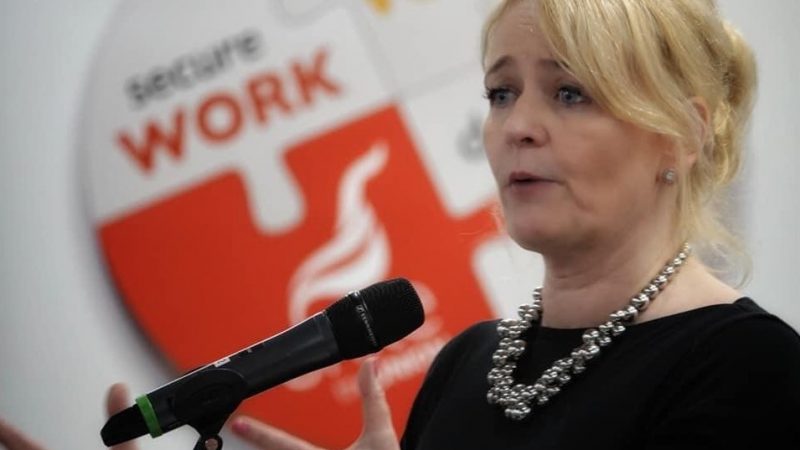
Sharon Graham has won the Unite general secretary election. She took 37.7% of ballots cast and finished 4,863 votes ahead of the next closest candidate Steve Turner, who had been widely considered the frontrunner. Turner secured the endorsement of both the outgoing general secretary Len McCluskey and Howard Beckett, who stood down from the race to back him. The shock result revealed on Wednesday means that Graham will become the first woman to lead the union and the new leader of the Labour Party’s biggest affiliate.
But the Labour Party is not her main concern. Pitching herself as the “workers’ candidate”, Graham argued during her campaign that the union movement is on life support and that Unite needs to end its “obsession” with Labour’s internal wranglings. She ran a campaign fundamentally calling for change – shifting focus away from the internal politics of the Labour Party and towards the workplace. Her election brings to an end to the McCluskey era. She has signalled that she will be less involved in Labour’s internal politics than her predecessor, vowing to “get back to the workplace and deliver what it says on the trade union tin – a relentless fight for jobs, pay and conditions”.
Allies of Keir Starmer may welcome the change. She is proudly on the left but less likely to clash with the Labour leader over internal party rows. However, Graham has also made clear that the party cannot rely on guaranteed funding from Unite, which donated £3m to Labour before the 2019 election, as she warned that there will be “no blank cheque” for the opposition party. “I want us to deal with the terms and conditions for workers,” she said. “If the Labour Party does things that are good for workers, they’ll have no problem with me. But if they don’t do what they’re supposed to do with workers, then they will have a problem with me.” Graham has not threatened to withhold Unite funding, but she will not be splashing the cash either.
The Unite result has perhaps less strictly factional implications than a Turner or Coyne win, the former backed by McCluskey and the latter by Starmer supporters, though it could have important financial consequences for Labour. Her slogan – “It’s Westminster versus the workplace: back to the workplace” – mirrored similar messages from GMB and UNISON, both of which have also undergone leadership changes recently. Gary Smith warned earlier this year that donations from GMB to Labour would be reviewed. The party will clearly have to listen and respond carefully to the unions in order to count on their donations.
Graham has a track record of running successful hostile campaigns. As the executive officer for organising and leverage at Unite, her department is credited with 15 major victories. She often uses strategies that go beyond the traditional approach and has been commended for diversifying union tactics. During the ‘BA betrayal’ campaign against British Airways, for example, MPs were asked to support motions against the airline’s ‘fire and rehire’ practices and its owner International Airlines Group was warned that it could lose landing slots at Heathrow. In the 2013 Grangemouth dispute, Unite activists picketed the homes of company directors. Going into the contest, she had already strong relationships with reps, whom she has worked with for years, and appealed directly to them in her campaign.
Heading up one of the largest unions in the country, Graham will inevitably be taking on the biggest of bosses. She is already taking aim at Amazon, campaigning for union recognition after setting up a hotline for it workers. She is working on home-working agreements, with a particular focus on the impact on women. She warned during the campaign that “home working done badly” can lead to “more work for the same pay”, and women being “cut out” of promotions. “I was home working and part going-out and my little one was home schooling. Actually the burden often does fall on women, we’re juggling all of these things around,” she said. Her win also means that two of the three largest unions in the UK are led by women, and Graham joins Christine McAnea (UNISON general secretary) and Frances O’Grady (general secretary of the TUC) in key roles leading the movement.
Her election will not lead to overnight change. She inherits existing realities in the union: Unite’s executive council members will hold office until 2023 and delegates to Labour conference have already been chosen (and they decide as a delegation how to vote), for example. We do not know yet how she will put into practice her change in focus from Westminster to the workplace. Of the 1,300-strong Unite workforce, there are already only a handful political staff members. Whoever replaces Graham in her role as executive officer for organising will be important. How her experience and passion for organising manifests in her leadership therefore remains to be seen, but both are significant for Labour, Unite and the wider labour movement.




More from LabourList
‘Tackling poverty should be the legacy of Keir Starmer’s government’
‘The High Court judgment brings more uncertainty for the trans community’
‘There are good and bad businesses. Labour needs to be able to explain the difference’